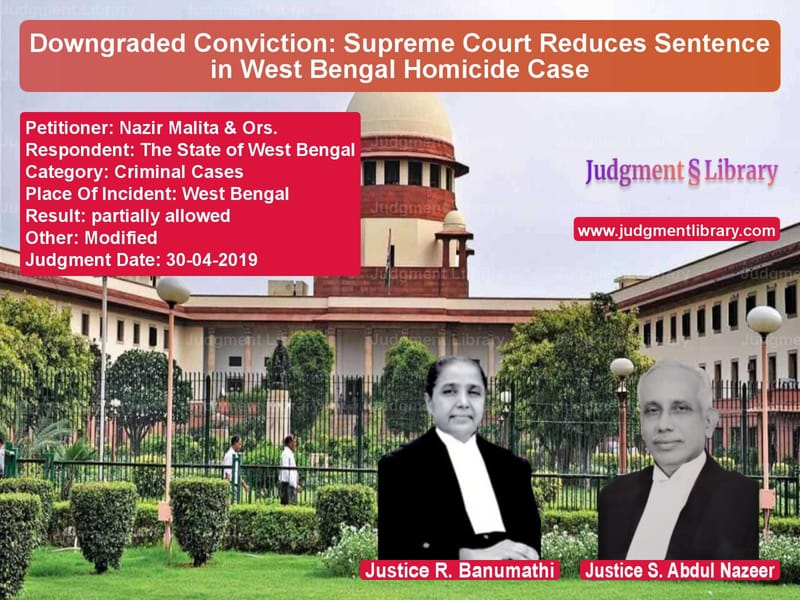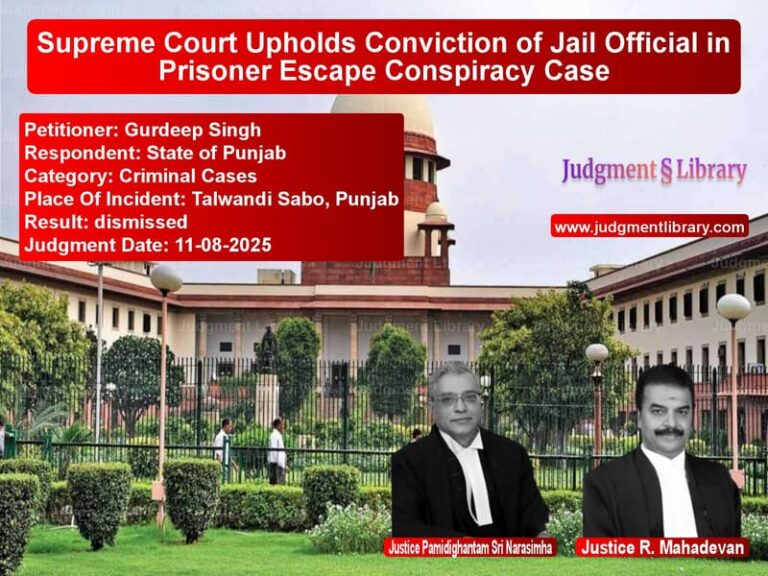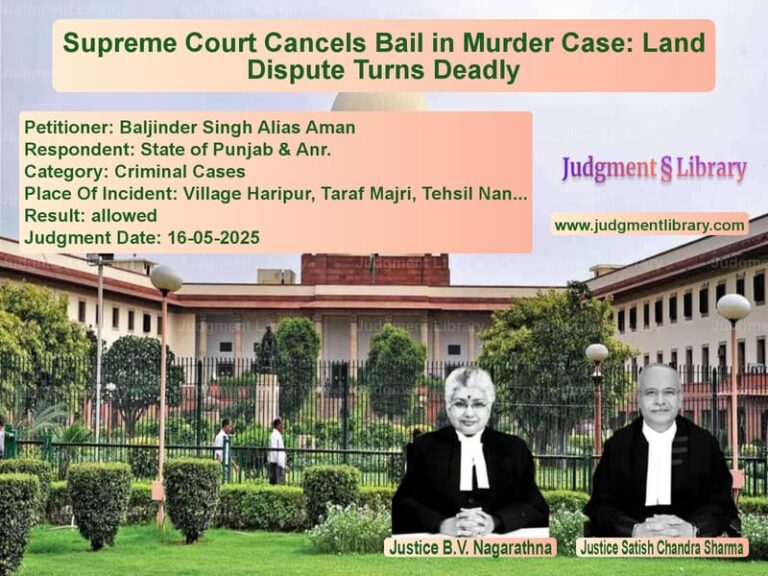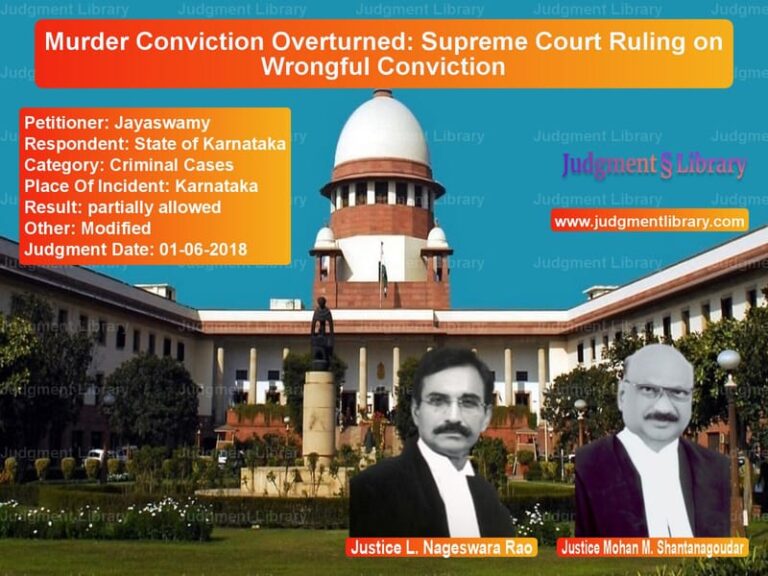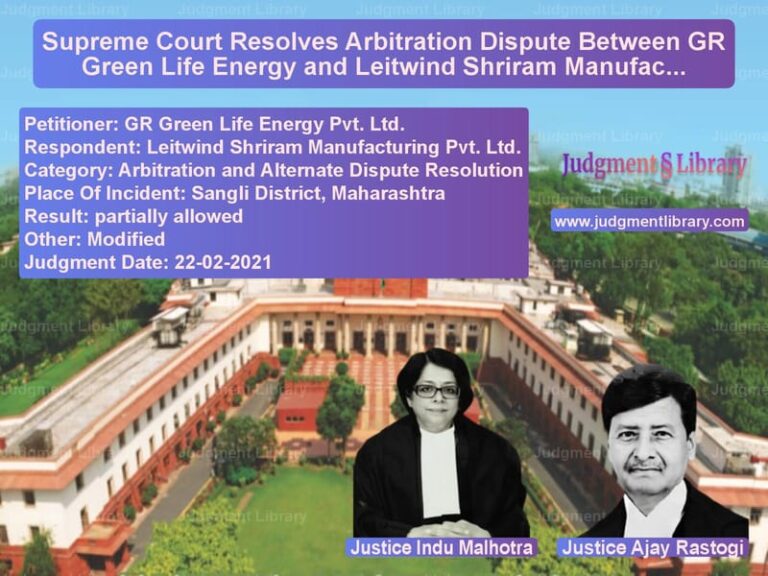Downgraded Conviction: Supreme Court Reduces Sentence in West Bengal Homicide Case
In a recent judgment, the Supreme Court of India partially allowed the appeal of the accused in the case of Nazir Malita & Ors. vs. The State of West Bengal. The case revolved around a homicide incident stemming from a land dispute, where the accused were initially sentenced to life imprisonment. However, after reviewing the circumstances, the Supreme Court reduced their sentence to ten years under Section 304 Part II of the Indian Penal Code (IPC), acknowledging the absence of premeditation in the crime.
The ruling highlights the importance of considering the intent and circumstances of a crime when determining the severity of punishment. The Court’s decision underscores the distinction between premeditated murder and culpable homicide not amounting to murder.
Background of the Case
The case stems from an altercation that took place on August 12, 2010, in West Bengal. The dispute involved a conflict over encroachment on a path, preventing the movement of a bullock cart. The altercation escalated in the evening, leading to the fatal assault of Morshed Malita, the deceased.
The main events of the case:
- The initial argument occurred in the morning when accused Hannan Mondal (later acquitted) was confronted by the deceased over the land issue.
- Later in the evening, a violent clash erupted between the deceased and the accused party.
- The deceased was assaulted with weapons, including fala (a sharp-edged farming tool) and ramda (a machete-like weapon).
- The deceased succumbed to injuries the following day, leading to the alteration of the charges from Sections 341, 325, and 326 IPC to Section 302 IPC.
- The trial court found the accused guilty under Section 304 IPC (culpable homicide not amounting to murder) and sentenced them to life imprisonment.
- The Calcutta High Court upheld the conviction but modified the sentence, reducing it to 14 years.
- The accused then approached the Supreme Court.
Arguments by the Appellants (Nazir Malita & Ors.)
The appellants presented the following arguments:
- There was no premeditation to kill the deceased; the incident was a sudden escalation of a property dispute.
- The trial court and High Court failed to specify under which part of Section 304 IPC they were convicted.
- The conviction should be reconsidered in light of the evidence, which indicated a fight between two groups rather than a one-sided attack.
- The sentence of life imprisonment (later reduced to 14 years) was excessive given the nature of the crime.
Arguments by the Respondent (State of West Bengal)
The State of West Bengal opposed the appeal and argued:
- The assault was severe, involving multiple accused attacking the deceased with sharp weapons.
- The injuries sustained by the deceased, including punctured lungs and deep cuts, indicated an intent to cause serious harm.
- The High Court had already granted leniency by reducing the sentence from life imprisonment to 14 years.
- No further reduction in the sentence should be considered.
Supreme Court’s Observations and Ruling
The Supreme Court examined the sequence of events, the nature of injuries, and the absence of premeditation in the crime. The Court noted:
“Considering the facts and circumstance of the case, in our view, there was no premeditation or pre-plan to commit the murder of the deceased-Morshed Malita. As rightly held by the Trial Court as well as the High Court, there was no premeditation and, therefore, they were rightly convicted under Section 304 read with Section 34 IPC.”
However, the Court also highlighted that neither the trial court nor the High Court clarified whether the conviction fell under Section 304 Part I or Part II IPC. The distinction is crucial as:
- Section 304 Part I applies when an act is done with the intention of causing death.
- Section 304 Part II applies when an act is done with knowledge that it is likely to cause death but without intent.
The Court observed that the accused used sharp-edged weapons, causing severe injuries. However, the lack of premeditation warranted a lesser charge. Thus, the Court ruled:
“Considering the facts and circumstances of the case and that there was no premeditation, the conviction of the appellants under Section 304 read with Section 34 IPC is modified to Section 304 Part II IPC and the sentence of imprisonment of fourteen years imposed upon the appellants is reduced to ten years.”
Final Ruling
The Supreme Court partially allowed the appeal:
- The conviction was downgraded from Section 304 IPC to Section 304 Part II IPC.
- The sentence was reduced from 14 years to 10 years.
- The punishment under Sections 341, 323, and 304 IPC was to run concurrently.
- The fine and default clause remained intact.
Significance of the Judgment
The ruling sets an important precedent in criminal jurisprudence:
- Distinction between murder and culpable homicide: The case reiterates that an act done without premeditation but with knowledge of fatal consequences falls under Section 304 Part II IPC, not Section 302 IPC.
- Sentencing considerations: The Court emphasized that the severity of punishment should align with intent, premeditation, and circumstances of the crime.
- Fair trial principles: The decision highlights the necessity for courts to specify the exact charge and provide justifications for sentencing.
By reducing the sentence, the Supreme Court acknowledged that while the crime was grave, it did not warrant the same punishment as premeditated murder. The ruling provides clarity on how courts should differentiate between various degrees of homicide under the IPC.
Petitioner Name: Nazir Malita & Ors..Respondent Name: The State of West Bengal.Judgment By: Justice R. Banumathi, Justice S. Abdul Nazeer.Place Of Incident: West Bengal.Judgment Date: 30-04-2019.
Don’t miss out on the full details! Download the complete judgment in PDF format below and gain valuable insights instantly!
Download Judgment: Nazir Malita & Ors. vs The State of West Be Supreme Court of India Judgment Dated 30-04-2019.pdf
Direct Downlaod Judgment: Direct downlaod this Judgment
See all petitions in Murder Cases
See all petitions in Attempt to Murder Cases
See all petitions in Judgment by R. Banumathi
See all petitions in Judgment by S. Abdul Nazeer
See all petitions in partially allowed
See all petitions in Modified
See all petitions in supreme court of India judgments April 2019
See all petitions in 2019 judgments
See all posts in Criminal Cases Category
See all allowed petitions in Criminal Cases Category
See all Dismissed petitions in Criminal Cases Category
See all partially allowed petitions in Criminal Cases Category

